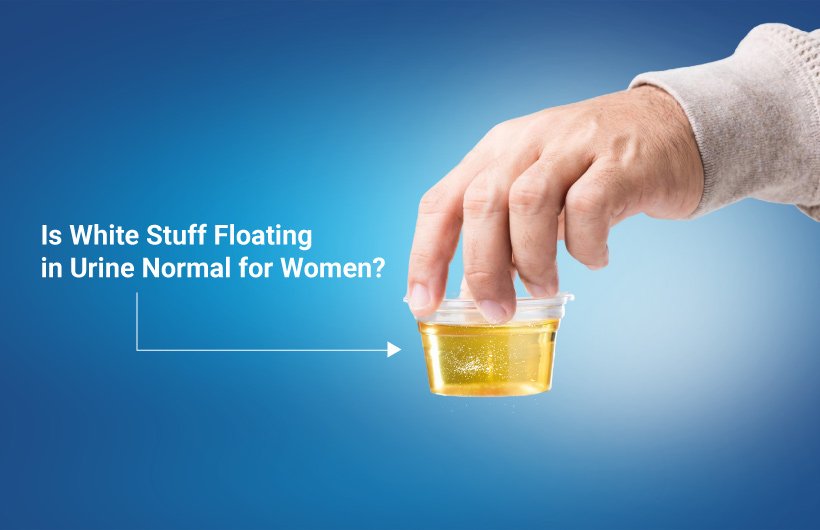Typical urine is faint yellow and free from any specks. A few conditions, such as pregnancy, infections, and kidney stones, can cause white particles in the urine or make it appear cloudy.
Pregnancy and urinary tract infections (UTIs) are usual causes of urinary changes. However, many other conditions can cause comparative side effects.
This article shows what causes white particles in urine and when to talk with a doctor.
Table of Contents
Causes of White Particles in Urine
Possible causes of white particles, or sediment, in urine include:
Pregnancy: During pregnancy, an assortment of hormonal changes can cause vaginal discharge and other side effects. Discharge can blend in with urine as it leaves the body and might appear as white particles in the urine. Anyone pregnant with discharge that appears more obscure or is joined by other side effects, such as itching or burning, should talk with a doctor, as they might have an infection.
Urinary tract infections (UTIs): These are a typical cause of white particles in the urine. UTIs happen when microbes enter the urethra and make their direction to the bladder, kidneys, or ureter, where they duplicate and cause the infection. Diseases, parasites, or growths entering the urinary tract might cause a UTI.
Other symptoms of UTIs include:
- pain in the abdomen or pelvis
- an urgent need to urinate
- pain while urinating
- trouble urinating
- cloudy or discolored urine
- foul-smelling urine
- fever or chills
Ovulation: Certain individuals with vaginas produce extra cervical mucus during ovulation. This mucus may have a milky or creamy texture and resemble a stringy white substance in the urine
Retrograde ejaculation: Retrograde ejaculation happens when the muscle or sphincter that keeps semen from entering the bladder does not contract properly. It can cause the individual to orgasm without ejaculating, as the semen goes into the bladder instead. Retrograde ejaculation does not represent immediate health concerns, yet infertility treatments may be necessary if a couple is trying to conceive.
Bacterial vaginosis: Bacterial vaginosis is inflammation in the vagina caused by an imbalance of bacteria. These can cause various symptoms, including a foul or fishy odor and a burning sensation while urinating. Specific individuals also notice a thin, grayish-white discharge that may blend in with the urine and cause white particles to appear. Treatment for bacterial vaginosis varies; however, it may include oral antibiotics or suppositories.
Yeast infections: A yeast infection may also cause white particles in the urine. Yeast infections frequently cause a thick, chunky discharge that may resemble cottage cheese. This discharge can blend in with the urine and lead to white bits appearing.
In addition to this, a yeast infection may cause other symptoms, such as:
- redness and swelling around the vagina
- itching or soreness
- soreness or pain while urinating
- pain during sex
Prostatitis: Prostatitis alludes to inflammation of the prostate gland and can be caused by a bacterial infection. It can cause discharge from the urethra that blends in with urine. Individuals with prostatitis may have other symptoms, including:
- chills or fever
- pain in the lower back
- throbbing or pain in the testicles, perineum, or rectum
- painful ejaculation
- erectile dysfunction
Most cases of bacterial prostatitis require antibiotics.
Sexually transmitted infections (STIs): STIs are transmitted through oral, anal, or vaginal sexual contact, and many of them can cause changes in the urine.
STIs that may cause genital discharge in all genders include:
This discharge may appear as white particles in the urine or make the urine itself appear white or cloudy.
Anyone who thinks they may have an STI should contact a doctor for diagnosis and treatment. They should also refrain from sexual contact or utilize a condom or other barrier technique to avoid transmitting an STI.
Kidney stones: Kidney stones create when the levels of certain substances, such as uric acid or calcium oxalate, in the body get too high. The overabundance can develop in the urinary tract and may become kidney stones. If the kidney stones are sufficiently small, the body may oust them through the urine without an individual noticing. They may appear as small white particles.
Kidney stones may also cause significant pain in the abdomen and other symptoms, including:
- feeling the need to urinate constantly
- difficulty urinating
- burning and pain during urination
- pain radiating through the lower abdomen, pelvis, and groin
- foul-smelling, cloudy, or bloody urine
Many kidney stones can be passed with the help of OTC pain medications. In rare cases, people may need medical procedures to break up and remove kidney stones.
Symptoms of White Particles in Urine
The appearance of white particles in urine may change depending on the underlying cause of the issue.
Symptoms may show up in different ways, including:
- white flakes in the urine
- stringy, cloudy substance in the urine
- grayish sediment floating in the urine
- murky or milky urine
An underlying medical condition will often cause a few other symptoms to appear. These are important to note as they help a doctor diagnose and treat the problem.
When to Speak with a Doctor
Specific purposes of white particles in the urine, such as pregnancy and ovulation, are viewed as usual and require no treatment.
If an individual notices any additional symptoms, such as itching or pain, they may have to speak with a doctor.
Additional symptoms may be an indication of an underlying condition or infection that requires brief treatment. Anyone with regular white particles in the urine or uncertain about the cause should also speak with a doctor.
Receiving a legitimate diagnosis and treatment are the best ways to forestall any potential complications.
CONCLUSION
Genital discharge is, in many cases, the cause of white particles in the urine. Finding the underlying cause of this discharge is essential for getting the proper treatment. Many patients are easily treatable with a doctor’s assistance.
Specific purposes, such as STIs or kidney stones, may require more attention. Notwithstanding, the standpoint is excellent in many cases.
Are you searching for the best doctor for your treatment? Contact the best Urology Surgeon, Dr. Dushyant Pawar!





